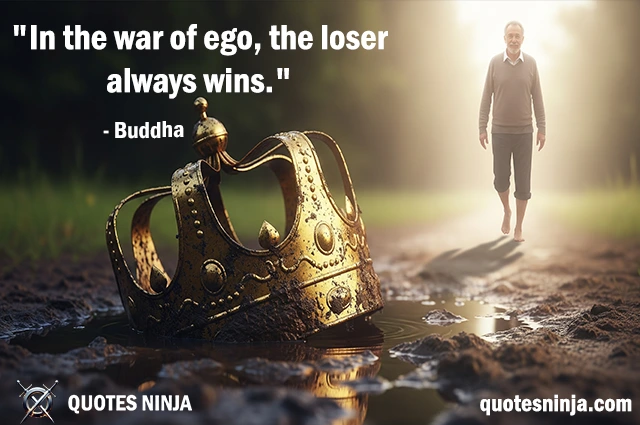
Wisdom Quote: “In the war of ego, the loser always wins.” attributed to Buddha, the quote suggests that surrendering pride and ego in a conflict is ultimately a strength, not a weakness.
Deeper Meaning of Wisdom Quote
The quote, “In the war of ego, the loser always wins” means that when conflicts are driven by pride, the person who chooses to let go—who steps away instead of fighting to be right—comes out ahead in a deeper way. Ego wants to control, prove, and protect itself. But feeding the ego often leads to stress, broken relationships, and inner emptiness. The so-called “loser” in an ego battle is the one who surrenders the need to win, who chooses peace over pride. That person may look like they gave in, but they actually win something far more valuable: freedom from emotional chaos, clarity, and inner strength. Real victory isn’t about dominating others—it’s about mastering yourself. By losing the ego battle, you win your peace.
Here’s a story inspired by Wisdom Quote “In the war of ego, the loser always wins.”
Wisdom Story: “The Quiet Victor“

The Confrontation:
Arjun paced the tiled floor of the conference room, fists clenched. His chest rose and fell sharply. Across the table, Rishi sat calm and still, flipping through the pages of the proposal they had spent six months building together.
“This is my section,” Arjun snapped, pointing at the third chapter. “You had no right to edit it without asking me.”
Rishi looked up, eyes steady. “It needed tightening. The client presentation is tomorrow, and it wasn’t ready.”
“You don’t get to decide that.” Arjun’s voice rose, echoing in the glass-walled room. “You always act like you’re above me.”
Silence followed. Tension buzzed between them like a live wire. Outside, their colleagues avoided looking in. They’d seen this dance before — Arjun, intense and fiery; Rishi, calm and unreadable.

The Surrender:
Finally, Rishi closed the folder.
“You’re right,” he said.
Arjun blinked. “What?”
“You’re right,” Rishi repeated. “I should’ve asked. I got caught up in making it better, and I didn’t think about how that would feel to you.”
The room fell still.
For a moment, Arjun didn’t know what to do with that. No defense, no counterattack — just acceptance.
“You’re… just letting it go?” he asked, his voice losing steam.
Rishi nodded. “Yes. I care more about us doing well together than about being right.” He gathered the documents calmly. “I’ll restore your original version if you want. We can present it that way.”
Arjun looked at him, confused. Just like that?
It felt like he had come to a battlefield armed and ready, only to find his opponent lowering their sword.

The Reflection:
Later that evening, Arjun sat alone at his desk. Everyone had gone home. The office lights dimmed overhead, casting long shadows across the floor. He thought back to the fight — or rather, the fight that never happened.
Rishi had let him “win.” But strangely, it didn’t feel like a victory.
Instead, it felt… sobering.
He opened the proposal again and reread the edited section. Objectively, Rishi’s version was cleaner. Tighter. More persuasive.
Arjun’s pride had been wounded, not his logic. But Rishi hadn’t rubbed it in. He hadn’t fought back. He had just… stepped aside.
And yet, in doing so, Rishi hadn’t seemed weak. Quite the opposite.
He had seemed free.

The Gesture:
The next morning, Arjun found Rishi already in the conference room, prepping for the client pitch. Without a word, Arjun placed the edited proposal — Rishi’s version — on the table.
“Yours is better,” he said simply.
Rishi looked up and offered a small smile. “It’s ours.”
Arjun hesitated. Then he sat down beside him. “How do you do that?” he asked.
“Do what?”
“Not need to be right all the time.”
Rishi leaned back in his chair. “Took me a while to learn. I used to be like you — ready to prove myself at every turn. But I kept burning bridges. And eventually, I realized that needing to win every argument isn’t strength. It’s fear.”
Arjun stayed quiet, letting the words settle.
“The ego,” Rishi continued, “wants to protect our image — to defend our value. But the truth is, you don’t lose anything by letting go. You actually gain peace. Perspective. People’s respect.”
Arjun nodded slowly. For the first time in a long while, he didn’t feel like he was shrinking when he backed down. He felt like he was growing.

The Growth:
Over the next few weeks, things shifted between them. Their working relationship grew smoother, more balanced. Arjun still had his fire, but now he paused before letting it take over. He started listening more — not just to respond, but to understand.
One day, their manager praised their pitch in front of the whole team. “You two have become a strong unit,” she said. “Whatever you’re doing — keep doing it.”
Arjun smiled, but said nothing. Internally, he knew the change had started the day Rishi had “lost” the fight.

The Realization:
Months later, at a leadership training session, Arjun found himself recounting the story to a small group.
“I used to think letting go was weakness,” he admitted. “Now I know it takes real strength. When you surrender your ego, you stop needing to be right. You start focusing on what actually matters.”
He paused and smiled.
“And in the war of ego, I’ve learned — the loser always wins.”
Here is the ending of Wisdom Story from the quote “In the war of ego, the loser always wins.”
Moral of the Story:
True strength lies not in winning arguments, but in letting go of ego. When we surrender the need to be right, we create space for growth, connection, and peace. In conflicts driven by pride, the one who “loses” by stepping back often gains the most — clarity, respect, and emotional freedom.
In the war of ego, the one who lets go wins where it truly matters.
To explore more on stories and dive into related ideas, be sure to check out the other posts where we cover all sort of stories related to quotes. Stay tuned for more…..
To explore more on quote topics, be sure to check out the other topics where we cover all categories of quotes. Stay tuned for more…..

